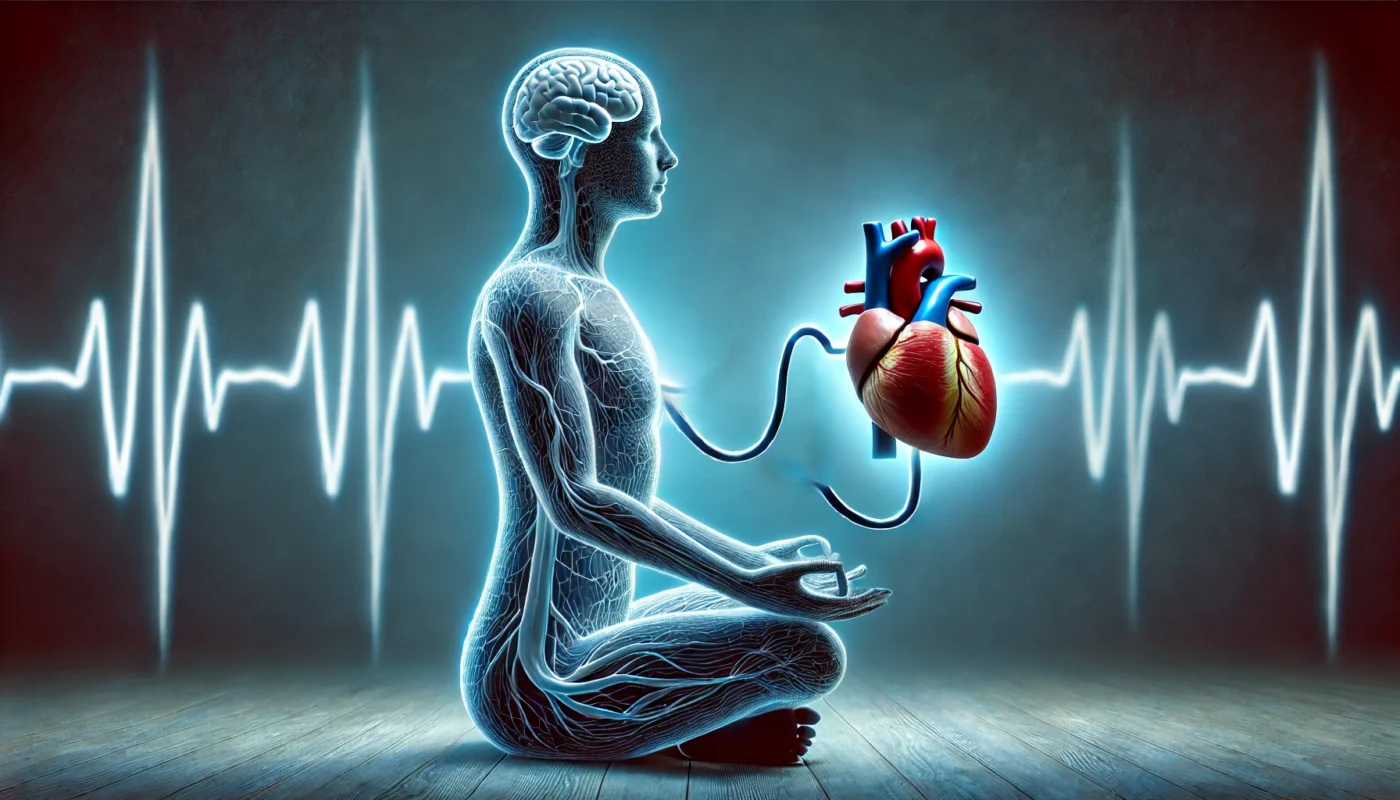Hypertension, or high blood pressure, is one of the most common chronic health conditions globally, affecting nearly half of all adults. It is a leading risk factor for cardiovascular disease, stroke, and kidney failure, making its management a priority for millions. While medications and lifestyle changes like diet and exercise are well-documented interventions, alternative approaches such as mindfulness and meditation have gained increasing attention as tools for helping lower hypertension. This article critically reviews the science behind meditation and its role in hypertension management, exploring the evidence, mechanisms, and practical implications for integrating meditation into a comprehensive treatment plan.
You May Also Like: The Role of Emotional Resilience in Managing Hypertension
Understanding Hypertension and Its Challenges
What Is Hypertension?
Hypertension is characterized by persistently elevated blood pressure, typically defined as a reading above 130/80 mmHg. Chronic high blood pressure puts excessive strain on the cardiovascular system, leading to serious complications over time.
Conventional Management Strategies
Standard treatment for hypertension involves:
- Medications: Such as angiotensin-converting enzyme (ACE) inhibitors, calcium channel blockers, and beta-blockers.
- Lifestyle Modifications: Including a heart-healthy diet (e.g., the DASH diet), regular physical activity, and weight management.
While effective, these approaches may not fully address the psychosocial factors contributing to hypertension, such as stress and anxiety, which is where meditation can offer complementary benefits.

What Is Meditation?
Meditation encompasses a variety of practices that involve focused attention, mindfulness, or mental relaxation. The goal is to achieve a state of calm and clarity, often reducing stress and enhancing mental well-being.
Types of Meditation Relevant to Hypertension
- Mindfulness Meditation: Involves focusing on the present moment and accepting it without judgment.
- Transcendental Meditation (TM): A technique using a mantra to achieve a deep state of relaxation.
- Loving-Kindness Meditation: Focuses on cultivating compassion and emotional resilience.
- Yoga and Breathwork: Combines physical poses with mindful breathing, targeting both mental and physical stress.
The Science Behind Meditation and Hypertension
How Meditation Affects Blood Pressure
Meditation influences blood pressure through several mechanisms:
- Reducing Sympathetic Nervous System Activity: Chronic stress activates the sympathetic nervous system (the “fight or flight” response), raising heart rate and blood pressure. Meditation promotes parasympathetic activity, encouraging relaxation and helping lower hypertension.
- Improving Endothelial Function: Stress-induced inflammation can impair the endothelium (the inner lining of blood vessels), leading to vascular stiffness. Meditation reduces stress and improves endothelial health.
- Enhancing Emotional Regulation: By mitigating anxiety and depression, meditation reduces stress-related blood pressure spikes.
Key Research Findings
1. Mindfulness-Based Stress Reduction (MBSR)
A structured program combining mindfulness meditation and yoga, MBSR has shown promise in reducing blood pressure.
- Evidence: A randomized controlled trial published in Hypertension (2013) found that an eight-week MBSR program significantly reduced systolic blood pressure (SBP) by 4.8 mmHg and diastolic blood pressure (DBP) by 1.9 mmHg in prehypertensive and hypertensive patients.
2. Transcendental Meditation
TM, which involves silently repeating a mantra, has been widely studied for its cardiovascular benefits.
- Evidence: A meta-analysis in Current Hypertension Reports (2014) revealed that TM reduced SBP by an average of 4.7 mmHg and DBP by 3.2 mmHg, comparable to some first-line antihypertensive medications.
3. Yoga and Breathwork
Yoga combines physical postures, controlled breathing, and meditation, offering a holistic approach to stress reduction.
- Evidence: A study in The Journal of Clinical Hypertension (2018) found that participants who practiced yoga for 12 weeks experienced a 6 mmHg reduction in SBP and a 4 mmHg reduction in DBP compared to a control group.
4. General Meditation Practices
Simple meditation techniques, such as focused attention or guided imagery, also show modest blood pressure benefits.
- Evidence: A review in The American Journal of Hypertension (2019) concluded that meditation practices resulted in a mean SBP reduction of 3.5 mmHg and DBP reduction of 2 mmHg.

Advantages of Meditation for Helping Lower Hypertension
- Accessibility: Meditation is a low-cost, non-invasive intervention that requires no special equipment.
- Complementary to Medications: It can enhance the effectiveness of pharmacological treatments without side effects.
- Stress Management: As stress is a significant contributor to hypertension, meditation offers a direct way to address this factor.
- Overall Well-Being: Beyond blood pressure, meditation improves mental clarity, emotional stability, and quality of life.
Limitations and Challenges
- Variability in Response: Not all individuals experience the same benefits, and some may require structured programs for optimal results.
- Consistency: Meditation requires regular practice, which can be challenging to sustain.
- Lack of Standardization: Different meditation techniques vary widely, making it difficult to compare outcomes across studies.
Integrating Meditation into a Management Plan to Lower Hypertension
1. Start with Simple Practices
Begin with short, guided meditation sessions of 5–10 minutes daily. Apps like Headspace or Calm provide accessible introductions to mindfulness techniques.
2. Combine with Lifestyle Changes
Meditation works best when paired with other hypertension management strategies, such as the DASH diet and regular exercise.
3. Seek Professional Guidance
Structured programs like MBSR or TM taught by certified instructors can ensure proper technique and maximize benefits.

Nutritional Supplements to Complement Meditation for Hypertension
Combining meditation with evidence-based nutritional supplements can enhance its effects on blood pressure. Below are five supplements shown to support vascular and mental health:
1. Magnesium Glycinate
Magnesium relaxes blood vessels and reduces vascular resistance, complementing meditation’s calming effects. A study in Magnesium Research (2016) found that magnesium supplementation reduced SBP by 5 mmHg.
2. Ashwagandha
This adaptogenic herb reduces cortisol levels and promotes relaxation, synergizing with meditation to manage stress-induced blood pressure. A trial in The Journal of Ayurveda and Integrative Medicine (2020) demonstrated significant reductions in stress and blood pressure with ashwagandha supplementation.
3. Omega-3 Fatty Acids
Omega-3s reduce inflammation and improve endothelial function, enhancing the vascular benefits of meditation. A meta-analysis in Hypertension (2018) reported reductions in SBP by 4 mmHg with omega-3 supplementation.
4. Coenzyme Q10 (CoQ10)
CoQ10 supports mitochondrial function and reduces oxidative stress, protecting against vascular damage. A study in Hypertension Research (2007) showed that CoQ10 supplementation lowered SBP by 11 mmHg.
5. Hibiscus Extract
Hibiscus promotes nitric oxide production, improving blood flow and reducing blood pressure. Research in The Journal of Nutrition (2010) found that hibiscus tea reduced SBP by 6 mmHg.
The Future of Meditation in Hypertension Management
As interest in integrative medicine grows, meditation is likely to become a cornerstone of hypertension management. Future directions include:
1. Digital Health Tools
Apps and wearable devices could provide real-time feedback on heart rate and stress levels, encouraging consistent meditation practice.
2. Personalized Programs
Emerging research may identify which individuals benefit most from specific meditation techniques, allowing for tailored interventions.
3. Long-Term Studies
While current evidence supports meditation’s short-term effects, long-term studies are needed to confirm its sustained impact on blood pressure and cardiovascular outcomes.

Conclusion
Meditation offers a promising, evidence-based approach to helping manage and lower hypertension by addressing the psychosocial factors that contribute to high blood pressure. Techniques such as mindfulness meditation, Transcendental Meditation, and yoga have demonstrated measurable reductions in systolic and diastolic blood pressure, making them valuable additions to traditional treatment plans. When combined with lifestyle changes and evidence-based nutritional supplements, meditation can significantly enhance overall heart health. While consistency and proper technique are essential, the simplicity and accessibility of meditation make it a practical and effective tool for those seeking to manage hypertension naturally. As research continues to expand, meditation may play an increasingly central role in hypertension treatment, helping individuals achieve long-term cardiovascular and mental health benefits.
References
- Hypertension. (2013). Effects of mindfulness-based stress reduction on blood pressure. Hypertension. Retrieved from https://www.ahajournals.org
- Current Hypertension Reports. (2014). Transcendental Meditation and blood pressure: A meta-analysis. Current Hypertension Reports. Retrieved from https://www.springer.com
- The Journal of Clinical Hypertension. (2018). Yoga and its impact on blood pressure in hypertensive patients. The Journal of Clinical Hypertension. Retrieved from https://onlinelibrary.wiley.com
- Magnesium Research. (2016). Magnesium supplementation and vascular health. Magnesium Research. Retrieved from https://www.springer.com
- The Journal of Nutrition. (2010). Effects of hibiscus tea on blood pressure. The Journal of Nutrition. Retrieved from https://academic.oup.com
Key TERMS for this article:
Meditation, Hypertension, Mindfulness, Blood Pressure Management, Stress Reduction, Cardiovascular Health, Nutritional Supplements
Relevant and useful TAGS for this article:
Hypertension, Meditation, Mindfulness, Stress Relief, Blood Pressure Control, Yoga, Cardiovascular Wellness, Holistic Health, Nutritional Support, Complementary Therapies
Important Note: The information contained in this article is for general informational purposes only, and should not be construed as health or medical advice, nor is it intended to diagnose, prevent, treat, or cure any disease or health condition. Before embarking on any diet, fitness regimen, or program of nutritional supplementation, it is advisable to consult your healthcare professional in order to determine its safety and probable efficacy in terms of your individual state of health.
Regarding Nutritional Supplements Or Other Non-Prescription Health Products: If any nutritional supplements or other non-prescription health products are mentioned in the foregoing article, any claims or statements made about them have not been evaluated by the U.S. Food and Drug Administration, and such nutritional supplements or other health products are not intended to diagnose, treat, cure, or prevent any disease.

